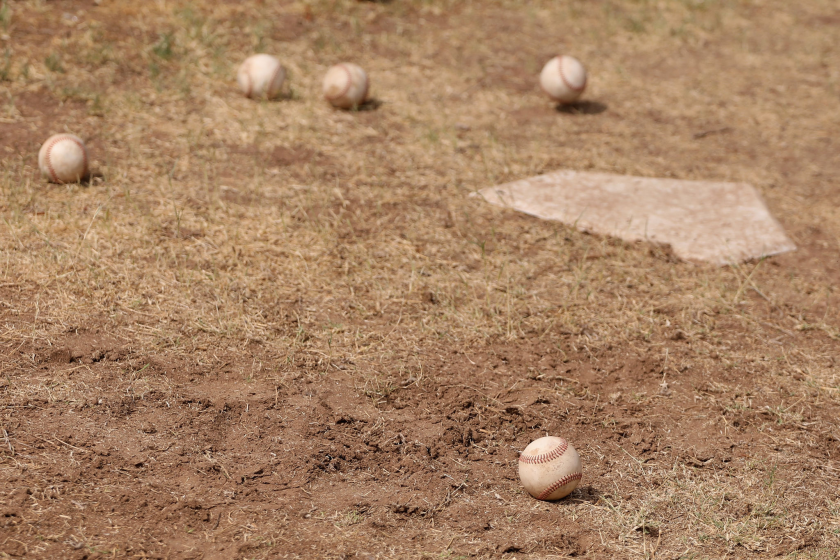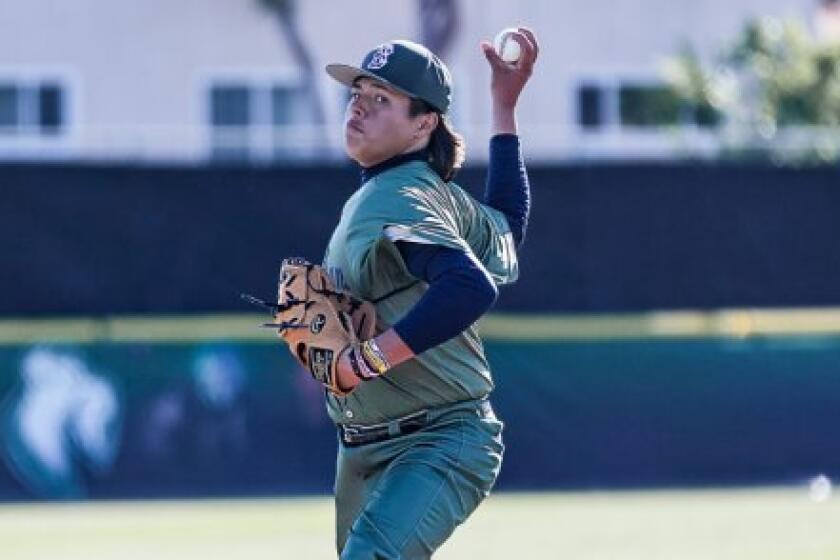Seasons of Sorrow at Dorsey High : Baseball: The Dons have endured 38 consecutive losses, the death of a teammate and the arrest of a coach.
- Share via
For years, the Dorsey High baseball team had a proud, winning tradition.
It was one of the best teams in the city in the 1940s and ‘50s, with six City Section major division titles to its credit. Its alumni include Detroit Tiger Manager Sparky Anderson, former Dodger Derrel Thomas and current Angel outfielder Chili Davis.
But recently, the Dons have experienced the dark side of baseball: back-to-back winless seasons and two unforgettable traumas.
Team member Wilfred Wright III died of a self-inflicted gunshot wound to the head while riding the team bus on March 24, 1992. One month later, Thomas, a former coach at Leuzinger who had returned to coach at his alma mater, was arrested on charges of possession of cocaine with intent to sell and now awaits trial.
To compound matters before the start of the 1993 season, three key players were kicked off the team for disciplinary reasons and another injured his back. When the regular season ended, only 10 players remained, one of them a senior.
Despite difficulties on and off the field, the underclassmen vow to return next season with a new outlook.
“What could go wrong that already hasn’t?” said catcher Che Johnson, who also plays for Dorsey’s successful football team. “We’ll find ways to have better luck next season.”
Certainly, the players could find better luck simply by transferring to other schools. Many inner-city players take advantage of transportation transfers to play for successful San Fernando Valley schools.
Although Dorsey has lost 38 consecutive games in two seasons, Don players say there are advantages to staying with the program. At San Fernando Valley schools, Dorsey players might find themselves on the bench more than on the field.
“These kids look at this as an experience,” said Bill Dillard II, whose son, Bill III, pitched and played right field. “They want to go to the next level regardless of whether they win or lose. You can’t let the frustration bother you, because life is full of frustrations.”
Dorsey does have talent, according to Crenshaw Coach Major Dennis.
“There are some good players on that team,” said Dennis, whose Cougars rolled over the Dons, 13-2, in the final regular-season game. “Basically, we overpowered them. I think that with a little more training and coaching they would have a competitive team.”
Bill Dillard III attended Crenshaw in 1992 and was offered a chance to pitch for the Cougars, who won the Southern Pacific Conference title. But Dillard liked his chances at Dorsey and transferred before the season started.
“They told him he would be humiliated, that he would be begging to come back,” his father said. “My son wanted to play every day and work to become better.”
Said the younger Dillard: “When we started to lose, I didn’t want to give up. I wanted to try harder.”
However, the team’s efforts to try harder have been overshadowed by tragedy.
Wright, a 17-year-old senior shortstop who had a reputation as a class clown, was playing with a gun and shot himself in the head as the team bus pulled off the Harbor Freeway near USC after a 20-5 loss at Gardena. Wright reportedly was carrying his mother’s gun with him because he had been threatened by gang members.
After the shooting, several players quit. The team, already in the midst of a winless season, relied on junior varsity players to fill the roster.
Among them was Brandon Brown, then a sophomore. Brown vowed to try to overcome the tragedy of Wright’s death.
“We played the season in Wilfred Wright’s honor,” he said.
A month later, the 17-member squad received more bad news: Their coach and a former sheriff’s deputy were arrested and charged with conspiring to sell and buy cocaine.
The team elected to continue the season while Thomas was jailed, but the pall cast over the diamond was too much to overcome.
Brown said he felt betrayed by Thomas: “He told us not to use drugs, to stay away from them. He didn’t do what he preached. I thought he was a good coach, but he got in trouble.”
Thomas’ trial on charges of transporting cocaine and conspiracy to transport and sell cocaine is scheduled to begin July 12 in Superior Court. He has been released on his own recognizance and was fired on April 27, 1992, as a walk-on coach.
David Arnold, the Dons’ assistant coach, and Johnny Turner, a Dorsey teacher, assumed control of the team after Thomas’ arrest. Arnold played center field for Dorsey in 1972, the last year the Dons played in the City finals. Venice won that game, 1-0.
“It was tough situation because I didn’t want to give up on the kids,” Arnold said. “There was a lot to overcome, but someone had to help hold them together.
Although his team finished with a 0-17 record in 1992 and 0-21 in 1993, Arnold was successful in developing players. One of his proteges was Brown, who was recently selected to the All-Southern League second team. Dillard also made the second team.
“It took a lot of practice and hard work, but (Arnold) taught me how to field and catch . . . all the little things that made me better,” Brown said. “I know how to zero in on the ball when I’m hitting.”
Brown had a rough game against Crenshaw in the season finale, trying to chase down line drives that skidded past him in center field. There are no outfield fences at Rancho Cienega Recreation Center, where the Dons play their home games, and Brown spent a lot of time running.
However, Brown will not quit trying.
“In spite of our records, kids still have the love for baseball and want to put on a uniform,” Arnold said.
On a sunny day with an ocean breeze blowing and a vendor cooking hot dogs, retired Don football Coach Carl Bates sat in the stands, watching the Crenshaw game with other alumni and faculty members.
Bates told stories about former Dons Anderson, Davis and Thomas. He talked about the glory days of Dorsey’s City titles in 1940, ‘41, ‘45, ‘50, ’54 and ’58.
He was optimistic that the Dons can recapture that glory.
“One year doesn’t mean it’s over,” Bates said. “We might come back and win it. I’ve seen it happen--maybe not at this school--but teams come back and (can) be on top of the world.”
More to Read
Get our high school sports newsletter
Prep Rally is devoted to the SoCal high school sports experience, bringing you scores, stories and a behind-the-scenes look at what makes prep sports so popular.
You may occasionally receive promotional content from the Los Angeles Times.






